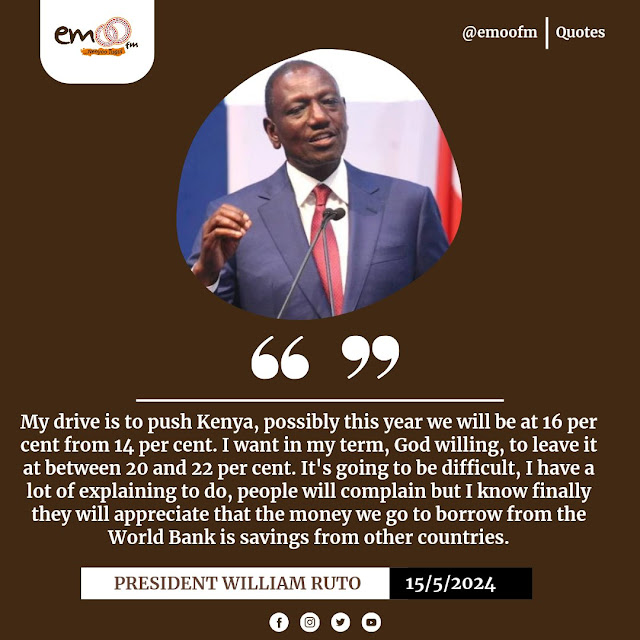Search This Blog
"Truth comes only to conquer those who have lost the art of receiving it as a friend." ~ Ravi Thakur
Featured
- Get link
- X
- Other Apps
The Folly of Ruto’s Taxation Strategy: Why Higher Taxes Won’t Bring Prosperity to Kenya
President William Ruto’s recent declaration to increase tax contributions from 14% to 22% by the end of his term reveals a fundamental misunderstanding of economic principles.
Our drive is to make sure that term ends in 2027. https://t.co/yWJv4Y3qaP
— Edwin Sifuna (@edwinsifuna) May 15, 2024
The Economic Mirage of Higher Taxes
Taxes, when applied judiciously, fund essential public services, infrastructure, and social programs. However, excessively burdening citizens and enterprises with higher taxes can have the opposite effect, stifling innovation, discouraging investment, and ultimately slowing economic growth. President Ruto’s ambition to raise taxes to 22% is a classic example of putting the cart before the horse.
Production, Not Taxation, Fuels Prosperity
Economic prosperity stems from productive activities that generate wealth and create jobs. To achieve this, Kenya needs to focus on enhancing its production value chain rather than squeezing more out of an already burdened populace. Foreign Direct Investments (FDIs) that add value to local production are crucial. Unlike extractive investments that deplete resources and exploit cheap labour, value-adding FDIs contribute to sustainable economic growth. These investments bring in technology, expertise, and capital that boost local industries, create jobs, and increase the country’s productive capacity.
The Need for Strategic Investment and Spending Efficiency
Kenya’s economic woes are compounded by significant tax revenue losses and inflated government expenditure. Plugging these leaks and ensuring efficient use of existing resources should precede any tax hikes. Ruto's government must focus on:
1. Reducing Corruption: Effective anti-corruption measures are critical. Billions are lost annually to graft, funds that could otherwise finance development projects and social programs.
2. Improving Tax Collection Efficiency: Streamlining tax collection and widening the tax base can increase revenue without raising rates. Digitalising tax systems and cracking down on tax evasion can ensure that everyone pays their fair share.
Millicent Omanga shows off her Range Rovers. #millicentomanga #bnnbasic
— Edgar Obare (@edgarobare) May 15, 2024
FOLLOW US ON BNN BASIC- https://t.co/Gjc5sX1rgv pic.twitter.com/rb5N8ixCMa
3. Prudent Spending: Cutting unnecessary expenditure and prioritising projects with high economic returns is essential. This includes investing in infrastructure, education, and healthcare, which are foundational to long-term economic growth.
The Contradiction in Ruto’s Administration
President Ruto’s administration, marked by a disconcerting blend of populist rhetoric and fiscal imprudence, undermines the very goals it professes. While crying wolf over national bankruptcy, his government presides over unprecedented looting of public coffers. This doublespeak erodes public trust and investor confidence, further destabilising the economy.
Practical Solutions for Economic Revival
To navigate out of this economic quagmire, Kenya needs a balanced approach that promotes production, attracts beneficial investments, and ensures efficient resource use. Here are key strategies. These are basic economic principles that any PhD holder, even in botany, ought to be be aware of:
1. Promote Local Industries: Support for small and medium-sized enterprises (SMEs) through favourable policies, access to credit, and reduced regulatory burdens can stimulate domestic production and innovation.
2. Encourage High-Value FDIs: Attract investments in sectors like manufacturing, technology, and agriculture that enhance the value chain rather than merely exploiting raw materials and cheap labour.
3. Enhance Infrastructure: Investing in infrastructure—roads, ports, energy—facilitates trade and reduces production costs, making Kenya more competitive globally.
4. Strengthen Governance: Transparent and accountable governance is crucial. Strengthening institutions to fight corruption and ensuring that public funds are used effectively can rebuild trust and stability.
5. Leverage Technology: Embracing digital transformation in government operations can enhance efficiency, reduce wastage, and improve service delivery.
Rethinking Fiscal Policies for Sustainable Growth
Kenya’s path to prosperity does not lie in higher taxes but in fostering an environment where production thrives, and investments yield tangible benefits. President Ruto’s administration must realign its focus from merely increasing tax rates to implementing policies that enhance productivity and ensure efficient use of resources. By addressing the root causes of economic inefficiencies and fostering a conducive environment for growth, Kenya can achieve sustainable prosperity without overburdening its citizens.
In the end, the question remains: Will President Ruto heed the lessons of economic wisdom, or will he continue down a path of fiscal folly, risking Kenya’s economic future for short-term revenue gains? The answer will determine the trajectory of the nation’s development and the well-being of its people.
- Get link
- X
- Other Apps
Popular Posts

The One On Why Uganda Produces Shitty Ads
- Get link
- X
- Other Apps

Of Australian Bogans Masquerading As Creatives In Nairobi Agencies
- Get link
- X
- Other Apps

Comments
Post a Comment